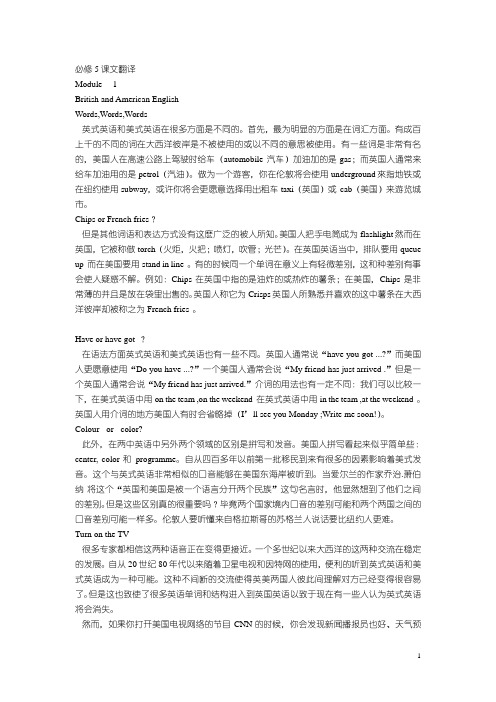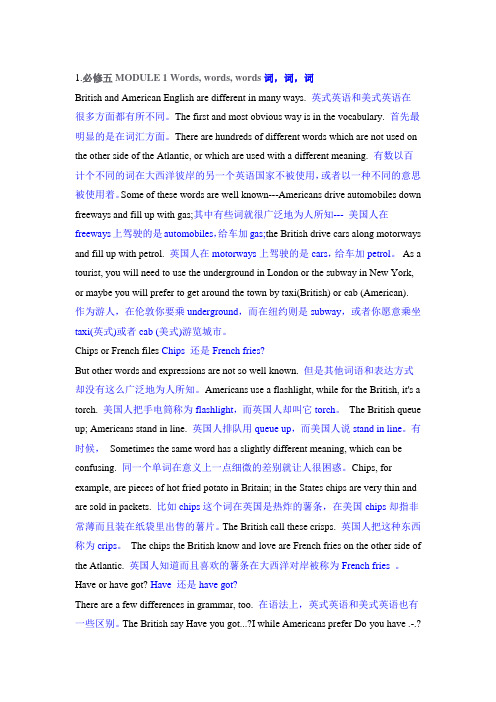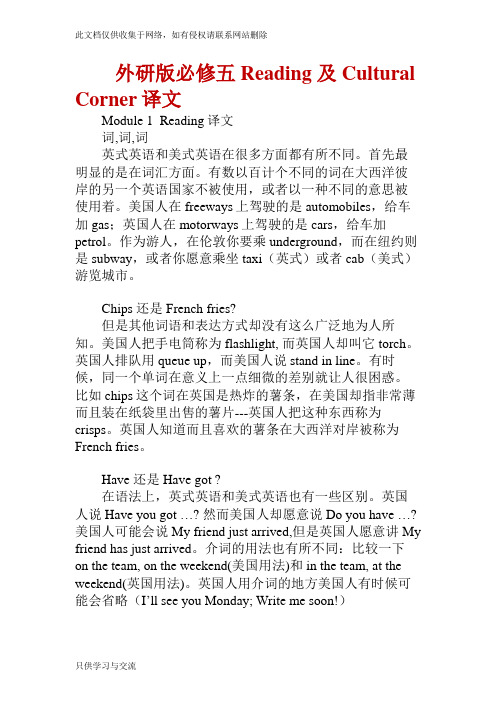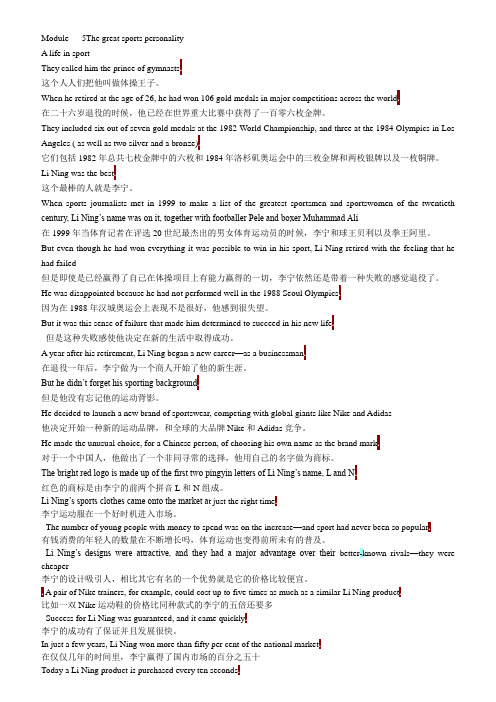高中英语必修5全部6个单元课文逐句翻译%28外研版%29
高中英语外研版必修五单词--中英文

module1 外研版高中英语必修五module1 外研版高中英语必修五1 have ⋯in common 1 有相同的特点2 n. linguist 2 语言学家3 make a difference 3 有影响,使不相同4 n. accent 4 口音5 adj. obvious 5 显然的;显而易见的6 n. motorway 6 (英)高速公路7 n. underground 7 (英)地铁8 n. subway 8 (美)地铁9 get around 9 四处走动(旅行)10 n. flashlight 10 (美)手电筒;火把11 vi. queue 11 (英)排队(等候)12 adj. confusing 12 令人困惑的;难懂的13 n. preposition 13 介词14 vt. compare 14 比较15 vt. omit 15 省略16 n. variety 16 种类17 vi. differ 17 不同;有区别18 n. settler 18 移民;定居者19 be similar to 19 与⋯⋯相似20 n. remark 20 评论;讲话变化21 n. variation 2122 have difficulty(in)doing sth 22 做某事有困难23 adv. steadily 23 不断地;持续地24 n. satellite 24 卫星25 n. flick 25 轻打;轻弹;抖动26 n. switch 26 开关27 ead to 27 引起;导致28 n. structure 28 结构;体系29 adv. rapidly 29 迅速地30 n. announcement 30 声明;宣告31 n. linguistics 31 语言学32 n. edition 32 (广播、电视节目的)期;版33 adj. cute 33 逗人喜爱的34 vt. add 34 加;增加35 in favour of 35 同意;支持36 vt. present 36 陈述;提出(观点、计划等)37 refer to ⋯as ⋯37 称⋯⋯为⋯⋯38 n. attempt 38 努力;尝试39 vt. simplify 39 简化40 n. combination 40 组合;结合41 thanks to 41 幸亏,多亏42 adj. distinctive 42 与众不同的43 n. look 43 外观;外表;样子44 vt. criticize 44 批评45 adj. standard 45 标准的46 n. reference 46 参考;查阅module2 module21 adj. intellectual 1 脑力的;思维的,2 adj. satisfying 2 令人满意的3 adj. stressful 3 充满压力的;紧张的4 n. accountant 4 会计5 n. barber 5 理发师6 n. biochemist 6 生物化学家7 n. electrician 7 电工;电器技师8 n. miner 8 矿工9 n. volunteer 9 志愿者10 vi. offer 10 (主动)提出(愿意做某事)11 n. signal 11 信号12 in particular 12 尤其;特别13 adj. sheer 13 垂直的;陡峭的14 on average 14 平均15 in theory 15 理论上;从理论上来说16 in practice 16 实际上;在实践中17 vt. respect 17 遵守18 n. toll 18 (事故、疾病等的)伤亡人数19 n. bend 19 弯曲处;弯道20 adj. circular 20 圆形的21 vt. direct 21 指挥22 pass by 22 经过23 take ⋯for granted 23 以为⋯⋯理所当然24 n. encounter 24 相遇;邂逅25 adj. profound 25 (影响)深刻的;极大的26 have an effect on 26 对⋯⋯产生影响27 n. mission 27 任务;职责;使命28 take up 28 站好位置以备⋯⋯29 adj. vertical 29 垂直的30 take notice of 30 注意到adj. temporary 31 n. freezer 32 vi. freeze 33 n. contract 34 vt. earn 35 adj. permanent 36 n. salary 37 n. staff 38 vt. sign 39 n. agent 40 n. analyst 41 vi. apply 42 n. deduction 43 adj. organizational 44 n. post 45 n. chef 46 vt. require 47 adj. renewable 48 adj. essential 49 n. model 50 n. shot 51 in response to 52 adj. grateful 53 adj. available 54 n. database 55 n. demand 56 暂时的;临时的冰箱冻住;冻僵合同;契约挣(钱)长久的;永久的;永恒的工资;薪水全体职员;员工签字;签署代理人;经纪人分析家;分析师申请推理;推断组织的工作;职位厨师需要(合同)可续签的必不可少的;绝对重要的模特(电影、电视或照片的)镜头作为⋯⋯的回应感激的;感谢的可获得的数据库;资料库要求;需要313233343536373839404142434445464748495051525354555657 n. bioinformatician 5758 adj. traditional 5859 n. youngster 5960 vi. suffer 6061 n. pathologist 6162 vi. double 6263 n. leisure 6364 n. individual 6465 n. fitness 6566 adj. outgoing 6667 n. personality 67 module3 module31 n. biography 12 n. fantasy 23 have connection with 34 n. detective 45 vt. solve 56 n. murderer 67 n. account 78 run away 89 n. companion 910 n. raft 1011 vi. pour 1112 n. shelter 1213 vi. paddle 1314 vi. lie 14 生物信息学(研究)者病理学家加倍休闲个人健康外向的个性;性格(由他人撰写的)传记幻想;想象与⋯⋯有联系侦探解决凶手;谋杀犯叙述;描写;报道(秘密地)逃跑同伴;伙伴木排;木筏(雨)倾盆而下遮蔽物;栖身之地用桨划(小船)说谎;撒谎15 vt. panic\ panicked\ panicked 15 (使)恐慌;(使)惊慌失措16 adj. curious 16 好奇的17 vt. tie 17 (用绳、带等)绑;系;拴18 n. rope 18 绳子19 n. beard 19 胡须20 n. fright 20 恐惧;害怕21 vi. crawl 21 爬行;匍匐前进22 adj. terrified 22 非常害怕的;极度恐慌的23 n. trunk 23 树干24 play a trick on sb. 24 捉弄某人,对某人恶作剧25 make up 25 编造(说法、解释等)26 n. outline 26 外形;轮廓27 vt. disturb 27 打扰28 n. comedy 28 喜剧29 adj. romantic 29 浪漫的;关于爱情的30 n. fiction 30 虚构或幻想出来的事31 n. review 31 (影视、音乐)评论32 be/feel in the mood 32 有意(做某事)33 set(a play, novel, etc.)in 33 设置(戏剧、小说)背景34 vt. resemble 34 与⋯相似35 vt. create 35 塑造;创作36 n. exception 36 例外37 vt. warn 37 警告38 adj. shallow 38 浅的39 n. adolescent 39 青少年40 adj. determined 40 坚决的41 make one ' s fortune 41 发财42 set off 42 出发;启程43 n. penny 43 (硬币)便士;(美)分44 vt. force 44 强迫;迫使45 n. pilot 45 领航员46 adj. vivid 46 (描述)生动的;逼真的47 vt. establish 47 确立;确定;建立48 n. reputation 48 名誉;名望;声望module4 module41 n. carnival 1 狂欢节2 adj. Christian 2 基督教的3 n. ghost 3 鬼;幽灵4 n. costume 4 服装;戏装;化妆服5 vt. hide 5 掩藏;躲藏6 n. confusion 6 杂乱;混乱7 vt. extend 7 延长8 vi. pretend 8 假装9 come to an end 9 完结10 dress up 10 装扮;打扮11 n. firearm 11 火器12 n. empire 12 帝国13 n. memory 13 记忆14 vt. revive 14 复兴;再兴起;再流行15 n. council 15 地方议会;政务委员会16 vi. book 16 预订17 vi. wander 17 漫步;闲逛18 adj. elegant 18 优美的;高雅的19 n. magic 19 魅力;魔力20 n. era 20 时代;年代21 n. calendar 21 日历;月历22 n. dove 22 鸽子23 n. bean 23 豆子24 n. flour 24 面粉25 n. garlic 25 大蒜26 n. onion 26 洋葱27 n. peas 27 豌豆28 n. pork 28 猪肉29 n. sausage 29 香肠30 consist of 30 由⋯⋯组成;由⋯⋯构成31 n. herb 31 (叶或种子)药草,芳草32 n. ingredient 32 (烹调用的)原料33 adj. relaxing 33 使人放松的34 n. whistle 34 哨子35 adj. tasty 35 美味可口的36 n. parade 36 (庆祝)游行37 adj. multicultural 37 多文化的;跨文化的38 n. plantation 38 农庄;庄园39 vt. mark 39 标志(着)40 n. trade 40 贸易41 vt. transport 41 运输;运送42 n. landowner 42 地主;土地拥有者43 vt. import 43 引进;进口44 n. master 44 主人45 vt. abolish 45 废除46 adj. magnificent 46 华丽的;富丽堂皇的47 n. celebration 47 庆典;庆祝48 n. freedom 48 自由49 vt. unite 49 联合50 n. origin 50 起源module5 module51 n. athletics 1 田径运动2 n. rugby 2 橄榄球3 n. bat 3 球拍;球棒4 n. club 4 高尔夫球棒5 n. net 5 网6 n. pitch 6 (足球、橄榄球等)球场7 n. ring 7 拳击台8 n. stadium 8 体育场;运动场9 n. track 9 跑道10 n. tracksuit 10 运动服11 n. trainer 11 运动鞋;教练员12 vi. retire 12 退休13 vi. perform 13 表现14 n. retirement 14 退休15 n. background 15 背景16 n. brand 16 商标;牌子17 n. sportswear 17 运动服装;休闲服装18 n. logo 18 (公司或组织的)标识19 on the increase 19 正在增加20 n. advantage 20 优势;长处21 vt. guarantee 21 保证22 vt. purchase 22 购买23 n. designer 23 设计师24 n. gymnast 24 体操运动员25 n. slogan 25 标语26 adj. specific 26 具体的;特定的27 n. symbol 27 符号28 n. marathon 28 马拉松29 vi. score 29 得分30 n. ministry 30 (政府的)部31 n. final 31 决赛32 n. champion 32 冠军33 n. quality 33 特性;品德;品性34 adj. ultimate 34 最后的35 rise to one ' s feet 35 站起身36 n. victory 36 胜利37 adv. dramatically 37 戏剧性地38 vi. protest 38 抗议39 vt. declare 39 宣布40 n. borough 40 (自治)区41 n. competitor 41 竞争者;对手42 adj. tough 42 费力的;棘手的;困难的module6 module61 vt. endanger 1 使⋯⋯处于险境;危及2 保护区;保护圈3 栖息地4 灭绝的;绝种的5 挣扎;斗争6 野生生物7 保护8 盗猎者;偷猎者 9(藏)羚羊10 战斗 11 高原 12 理想的 13 披肩14 牧群;兽群 15 值 ⋯⋯钱 16 剥皮;去皮 17 现场18 (警方的)突击搜查 19 没收 20 环境;情况 21 同时22 (买卖贵重商品)商人 23目标;目的24 爬行动物 25 涉及;包括 26 活的 27产卵;下蛋2 n. reserve3 n. habitat4 adj. extinct5 n. struggle6 n. wildlife7 vt. protect8 n. poacher9 n. antelope 10 n. battle 11 n. plateau 12 adj. ideal 13 n. shawl 14 n. herd 15 prep. worth16 vt. skin 17 n. spot 18 n. raid 19 vt. confiscate 20 n.(-s) condition21 adv. meanwhile 22 n. dealer 23 n. aim 24 n. reptile 25 vt. involve 26 adj.live 27 vt.lay28 n. wonder 28 奇迹29 n. insect 29 昆虫30 n. mammal 30 哺乳动物31 n. bald 31 秃(头)的32 be concerned about sth 32 关心某事;担心某事33 n. whale 33 鲸34 n. ibis 34 鹮35 feed on 35 (动物)以⋯⋯为食36 n. brink 36 边缘37 n. extinction 37 灭绝;绝种38 n. initial 38 首字母39 stand for 39 代表40 n. branch 40 分支机构;办事处41 n. continent 41 大陆;洲42 n. focus 42 焦点;集中点43 n. energy 43 能源44 vt. waste 44 浪费45 vt. monitor 45 监测46 set up 46 建立;设立。
(完整版)外研版高中英语必修5课文翻译

必修5课文翻译Module 1British and American EnglishWords,Words,Words英式英语和美式英语在很多方面是不同的。
首先,最为明显的方面是在词汇方面。
有成百上千的不同的词在大西洋彼岸是不被使用的或以不同的意思被使用。
有一些词是非常有名的,美国人在高速公路上驾驶时给车(automobile 汽车)加油加的是gas;而英国人通常来给车加油用的是petrol(汽油)。
做为一个游客,你在伦敦将会使用underground來指地铁或在纽约使用subway,或许你将会更愿意选择用出租车taxi(英国)或cab(美国)来游览城市。
Chips or French fries?但是其他词语和表达方式没有这麽广泛的被人所知。
美国人把手电筒成为flashlight然而在英国,它被称做torch(火炬,火把;喷灯,吹管;光芒)。
在英国英语当中,排队要用queue up 而在美国要用stand in line 。
有的时候同一个单词在意义上有轻微差别,这和种差别有事会使人疑惑不解。
例如:Chips 在英国中指的是油炸的或热炸的薯条;在美国,Chips 是非常薄的并且是放在袋里出售的。
英国人称它为Crisps英国人所熟悉并喜欢的这中薯条在大西洋彼岸却被称之为French fries 。
Have or have got ?在语法方面英式英语和美式英语也有一些不同。
英国人通常说“have you got ...?”而美国人更愿意使用“Do you have ...?”一个美国人通常会说“My friend has just arrived .”但是一个英国人通常会说“My friend has just arrived.”介词的用法也有一定不同:我们可以比较一下,在美式英语中用on the team ,on the weekend 在英式英语中用in the team ,at the weekend 。
高中英语必修5课文逐句翻译(外研版)

高中英语必修5课文逐句翻译(外研版)1.必修五MODULE 1 Words, words, words词,词,词British and American English are different in many ways. 英式英语和美式英语在很多方面都有所不同。
The first and most obvious way is in the vocabulary. 首先最明显的是在词汇方面。
There are hundreds of different words which are not used on the other side of the Atlantic, or which are used with a different meaning. 有数以百计个不同的词在大西洋彼岸的另一个英语国家不被使用,或者以一种不同的意思被使用着。
Some of these words are well known---Americans drive automobiles down freeways and fill up with gas;其中有些词就很广泛地为人所知--- 美国人在freeways上驾驶的是automobiles,给车加gas;the British drive cars along motorways and fill up with petrol.英国人在motorways上驾驶的是cars,给车加petrol。
As a tourist, you will need to use the underground in London or the subway in New York, or maybe you will prefer to get around the town bytaxi(British) or cab (American).作为游人,在伦敦你要乘underground,而在纽约则是subway,或者你愿意乘坐taxi(英式)或者cab (美式)游览城市。
高中英语必修5课文逐句翻译(外研版)

1.必修五MODULE 1 Words, words, words词,词,词British and American English are different in many ways. 英式英语和美式英语在很多方面都有所不同。
The first and most obvious way is in the vocabulary. 首先最明显的是在词汇方面。
There are hundreds of different words which are not used on the other side of the Atlantic, or which are used with a different meaning. 有数以百计个不同的词在大西洋彼岸的另一个英语国家不被使用,或者以一种不同的意思被使用着。
Some of these words are well known---Americans drive automobiles down freeways and fill up with gas;其中有些词就很广泛地为人所知--- 美国人在freeways上驾驶的是automobiles,给车加gas;the British drive cars along motorways and fill up with petrol.英国人在motorways上驾驶的是cars,给车加petrol。
As a tourist, you will need to use the underground in London or the subway in New York, or maybe you will prefer to get around the town by taxi(British) or cab (American).作为游人,在伦敦你要乘underground,而在纽约则是subway,或者你愿意乘坐taxi(英式)或者cab (美式)游览城市。
外研版必修五课文及文化角译文讲课稿

外研版必修五Reading 及Cultural Corner译文Module 1 Reading译文词,词,词英式英语和美式英语在很多方面都有所不同。
首先最明显的是在词汇方面。
有数以百计个不同的词在大西洋彼岸的另一个英语国家不被使用,或者以一种不同的意思被使用着。
美国人在freeways上驾驶的是automobiles,给车加gas;英国人在motorways上驾驶的是cars,给车加petrol。
作为游人,在伦敦你要乘underground,而在纽约则是subway,或者你愿意乘坐taxi(英式)或者cab(美式)游览城市。
Chips 还是French fries?但是其他词语和表达方式却没有这么广泛地为人所知。
美国人把手电筒称为flashlight, 而英国人却叫它torch。
英国人排队用queue up,而美国人说stand in line。
有时候,同一个单词在意义上一点细微的差别就让人很困惑。
比如chips这个词在英国是热炸的薯条,在美国却指非常薄而且装在纸袋里出售的薯片---英国人把这种东西称为crisps。
英国人知道而且喜欢的薯条在大西洋对岸被称为French fries。
Have 还是Have got ?在语法上,英式英语和美式英语也有一些区别。
英国人说Have you got …? 然而美国人却愿意说 Do you have …? 美国人可能会说My friend just arrived,但是英国人愿意讲My friend has just arrived。
介词的用法也有所不同:比较一下on the team, on the weekend(美国用法)和in the team, at the weekend(英国用法)。
英国人用介词的地方美国人有时候可能会省略(I’ll see you Monday; Write me soon!)Colour还Color?此外,在两种英语中另外两个领域的区别是拼写和发音。
外研必修五Module 5 课文及翻译

Module 5The great sports personalityA life in sportThey called him the prince of gymnasts这个人人们把他叫做体操王子。
When he retired at the age of 26, he had won 106 gold medals in major competitions across the world在二十六岁退役的时候,他已经在世界重大比赛中获得了一百零六枚金牌。
They included six out of seven gold medals at the 1982 World Championship, and three at the 1984 Olympics in Los Angeles ( as well as two silver and a bronze)它们包括1982年总共七枚金牌中的六枚和1984年洛杉矶奥运会中的三枚金牌和两枚银牌以及一枚铜牌。
Li Ning was the best这个最棒的人就是李宁。
When sports journalists met in 1999 to make a list of the greatest sportsmen and sportswomen of the twentieth century, Li Ning’s name was on it, together with footballer Pele and boxer Muhammad Ali在1999年当体育记者在评选20世纪最杰出的男女体育运动员的时候,李宁和球王贝利以及拳王阿里。
But even though he had won everything it was possible to win in his sport, Li Ning retired with the feeling that he had failed但是即使是已经赢得了自己在体操项目上有能力赢得的一切,李宁依然还是带着一种失败的感觉退役了。
【高二英语必修五外研版课文翻译】高二英语课本课文翻译
【高二英语必修五外研版课文翻译】高二英语课本课文翻译翻译也是英语考试必考的题型之一,下面是小编整理的高二英语课本课文翻译,希望对你有帮助。
MARTY’S STORYHi, my name is Marry Fielding and I guess you could say that I am one in a million. In other words, there are not many people like me. You see, I have a muscle disease which makes me very weak, so I cant run or climb stairs as quickly as other people. In addition, sometimes I am very clumsy and drop things or bump into furniture. Unfortunately, the doctors dont know how to make me better, but I am very outgoing and have learned to adapt to my disability. My motto is: live One day at a time.Until I was ten years old I was the same as everyone else. I used to climb trees, swim and play football. In fact, I used to dream about playing professional football and possibly representing my country in the World Cup. Then I started to get weaker and weaker, until I could only enjoy football from a bench at the stadium. In the end I went into hospital for medical tests. I stayed there for nearly three months. I think I had at least a billion tests, including one in which they cut out a piece of muscle from my leg and looked at it under a microscope. Even after all that, no one could give my disease a name and it is difficult to know what the future holds.One problem is that I dont look any different from other people. Sosometimes some children in my primary school would laugh, when I got out of breath after running a short way or had to stop and rest halfway up the stairs. Sometimes, too, I was too weak to go to school so my education suffered. Every time I returned after an absence, I felt stupid because I was behind the others.My life is a lot easier at high school because my fellow students have accepted me. The few who cannot see the real person inside my body do not make me annoyed, and I just ignore them. All in all I have a good life.I am happy to have found many things I can do, like writing and computer programming. My ambition is to work for a firm that develops computer software when I grow up. Last year invented a computer football game and a big company has decided to buy it from me. I have a very busy life with no time to sit around feeling sorry for myself. As well as going to the movies and football matches with my friends, I spend a lot of time with my pets. I have two rabbits, a parrot, a tank full of fish and a tortoise. To look after my pets properly takes a lot of time but I find it worthwhile. I also have to do a lot of work, especially if I have been away for a while.In many ways my disability has helped me grow stronger psychologically and become more independent. I have to work hard to live a normal life but it has been worth it. If I had a chance to say one thing to healthy children, it would be this: having a disability does not mean your life isnot satisfying. So dont feel sorry for the disabled or make fun of them, and dont ignore them either. Just accept them for who they are, and give them encouragement to live as rich and full a life as you do.Thank you for reading my story.Unit 1马丁的故事嗨,我的名字是马丁。
高中英语必修五课文及翻译
-必修 5Unit 2 The United KingdomReadingPUZZLES IN GEOGRAPHYPeople may wonder why different words are used to describe these four countries: England, Wales, Scotland and Northern Ireland. You can clarify this question if you study British history.First there was England. Wales was linked to it in the thirteenth century. Now when people refer to England you find Wales included as well. Next England and Wales were joined to Scotland in the seventeenth century and the name was changed to "Great Britain". Happily this was accomplished without conflict when King James of Scotland became King of England and Wales as well. Finally the English government tried in the early twentieth century to form the United Kingdom by getting Ireland connected in the same peaceful way. However, the southern part of Ireland was unwilling and broke away to form its own government. So only Northern Ireland joined with England, Wales and Scotland to become the United Kingdom and this was shown to the world in a new flag called the Union Jack.To their credit the four countries do work together in some areas (eg, the currency and international relations), but they still have very different institutions. For example, Northern Ireland, England and Scotland have different educational and legal systems as well as different football teams for competitions like the World Cup!England is the largest of the four countries, and for convenience it is divided roughly into three zones. The zone nearest France is called the South of England, the middle zone is called the Midlands and the one nearest to Scotland is known as the North. You find most of the population settled in the south, but most of the industrial cities in the Midlands and the North of England. Although, nationwide, these cities are not as large as those in China, they have world-famous football teams and some of them even have two! It is a pity that the industrial cities built in the nineteenth century do not attract visitors. For historical architecture you have to go to older but smaller towns built by the Romans. There you will find out more about British history and culture.The greatest historical treasure of all is London with its museums, art collections, theatres, parks and buildings. It is the centre of national government and its administration. It has the oldest port built by the Romans in the first century AD, the oldest building begun by the Anglo-Saxons in the 1060s and the oldest castle constructed by later Norman rulers in 1066. There has been four sets of invaders of England. The first invaders, the Romans, left their towns and roads. The second, the Anglo-Saxons, left their language and their government. The third, the Vikings, influenced the vocabulary and place-names of the North of England, and the fourth, the Normans, left castles and introduced new words for food.If you look around the British countryside you will find evidence of all these invaders. You must keep your eyes open if you are going to make your trip to the United Kingdom enjoyable and worthwhile.人们可能会奇怪为什么用不同的词语来描述英格兰、威尔士、苏格兰和北爱尔兰这四个国家。
高二英语必修五课文(reading)逐句翻译
Par 6
1.In another part of London, he found supporting evidence from two other deaths that were linked to the Broad Street outbreak. 在伦敦的另一个地区,他从两个与宽街暴发的霍乱有关联的死亡 病例中发现了有力的证据。 2.A woman, who had moved away from Broad Street, liked the water from the pump so much that she had it delivered to her house every day.有一位妇女是从宽街搬过来的,她特别喜欢那 里的水,每天都要派人从水泵打水运到家里来。 3.Both she and her daughter died of cholera after drinking the water.她和她的女儿喝了这种水,都得了霍乱而死去。 4.With this extra evidence John Snow was able to announce with certainty that polluted water carried the virus.有了这个特别 的证据,约翰· 斯诺就能够肯定地宣布,这种被污染了的水携带着 病菌。
Par 2
1.He became interested in two theories that possibly explained how cholera killed people.斯诺对霍乱致人死地的两种推测都很 感兴趣。 2.The first suggested that cholera multiplied in the air. A cloud of dangerous gas floated around until it found its victims.一种看法 是霍乱病毒在空气中繁殖着,像一股危险的气体到处漂浮,直到 找到病毒的受害者为止。 3.The second suggested that people absorbed this disease into their bodies with their meals.第二种看法是人们在吃饭的时候把 这种病毒引入体内的。 4.From the stomach the disease quickly attacked the body and soon the affected person died.病从胃里发作而迅速殃及全身, 患者就会很快地死去。
(完整版)外研社高中英语必修1-5课文中英文对照
外研社高中英语必修1-5 课文中英文对照必修一我上高中的第一天\ Module 1 My First Day at Senior High My name is Li Kang. I live in Shijiazhuang, a city not far from Beijing. It is the capital city of Hebei Province. 我叫李康。
居住在石家庄,一座离北京不远的城市。
这座城市是河北省省会。
Today is my first day at Senior High school and I’m writing down my thoughts about it. 今天是我上高中的第一天,我将我对这一天的看法写下来。
My new school is very good and I can see why. The teachers are very enthusiastic and friendly and the classrooms are amazing. 我的新学校很好,并且我能够明白其原因。
老师非常热情、友好,课堂令人感到惊奇。
Every room has a computer with a special screen, almost as big as a cinema screen. 每个教室都有一台计算机,并配有特别的显示屏,其大小几乎同电影院的银幕一样。
The teachers write on the computer, and their words appear on the screen behind them. 老师写在电脑上,单词就出现在后面的屏幕上。
The screens also show photographs, t ext and information from websites. They’re brilliant! 屏幕还可展示图片、课文、和网站上的信息。
- 1、下载文档前请自行甄别文档内容的完整性,平台不提供额外的编辑、内容补充、找答案等附加服务。
- 2、"仅部分预览"的文档,不可在线预览部分如存在完整性等问题,可反馈申请退款(可完整预览的文档不适用该条件!)。
- 3、如文档侵犯您的权益,请联系客服反馈,我们会尽快为您处理(人工客服工作时间:9:00-18:30)。
必修五1.MODULE 1Words, words, words词,词,词British and American English are different in many ways. 英式英语和美式英语在很多方面都有所不同。
The first and most obvious way is in the vocabulary. 首先最明显的是在词汇方面。
There are hundreds of different words which are not used on the other side of the Atlantic, or which are used with a different meaning. 有数以百计个不同的词在大西洋彼岸的另一个英语国家不被使用,或者以一种不同的意思被使用着。
Some of these words are well known---Americans drive automobiles down freeways and fill up with gas;其中有些词就很广泛地为人所知--- 美国人在freeways上驾驶的是automobiles,给车加gas;the British drive cars along motorways and fill up with petrol.英国人在motorways上驾驶的是cars,给车加petrol。
As a tourist, you will need to use the underground in London or the subway in New York, or maybe you will prefer to get around the town by taxi(British) or cab (American).作为游人,在伦敦你要乘underground,而在纽约则是subway,或者你愿意乘坐taxi(英式)或者cab (美式)游览城市。
Chips or French files Chips 还是French fries?But other words and expressions are not so well known.但是其他词语和表达方式却没有这么广泛地为人所知。
Americans use a flashlight, while for the British, it's a torch.美国人把手电筒称为flashlight,而英国人却叫它torch。
The British queue up; Americans stand in line.英国人排队用queue up,而美国人说stand in line。
有时候,Sometimes the same word has a slightly different meaning, which can be confusing. 同一个单词在意义上一点细微的差别就让人很困惑。
Chips, for example, are pieces of hot fried potato in Britain; in the States chips are very thin and are sold in packets.比如chips这个词在英国是热炸的薯条,在美国chips却指非常薄而且装在纸袋里出售的薯片。
The British call these crisps.英国人把这种东西称为crips。
The chips the British know and love are French fries on the other side of the Atlantic. 英国人知道而且喜欢的薯条在大西洋对岸被称为French fries 。
Have or have got? Have 还是have got?There are a few differences in grammar, too. 在语法上,英式英语和美式英语也有一些区别。
The British say Have you got...?I while Americans prefer Do youhave .-.?英国人说Have you got·?然而美国人却愿意说Do you have ...?An American might say My friend just arrived, but a British person wouldsay My friend has just arrived.美国人可能会说My friend just arrived,但是英国人愿意讲My friend has just arrived 。
Prepositions, too, can be different: compare on the team, on the weekend (American) with in the team, at the weekend (British). 介词的用法也有所不同:比较一下on the team, on the weekend (美国用法) 和in the team, at the weekend (英国用法)。
The British use prepositions where Americans sometimes omit them (.I'll see you Monday, Write me soon!).英国人用介词的地方美国人有时候可能会省略(I"ll see you Monday; Write me soon!) 。
Colour or color? Colour还是color?The other two areas in which the two varieties differ are spelling and pronunciation. 此外,在两种英语中另外两个领域的区别是拼写和发音。
Americanspelling seems simpler:美式英语的拼写看上去更简单一些:center, color and program instead of centre, colour and programme. center, color和program 是美式拼法,centre, colour和programme 是英式拼法。
Many factors have influenced American pronunciation since the first settlers arrived four hundred years ago. 自从400年前第一批移民的到来,有很多因素影响了美语发音。
The accent, which is most similar to British English, can be heard on the East Coast of the US. 在美国东海岸能够听到跟英式英语非常接近的口音。
When the Irish writer George Bernard Shaw made the famous remark that the British and the Americans are two nations divided by a common language, he was obviously thinking about the differences. 当爱尔兰作家萧伯纳讲那句名言:英国和美国是被同一种语言分开的两个民族的时候,他显然想到了它们的区别。
But are they really so important? 但是这些区别真的如此重要吗?After all, there is probably as much variation of pronunciation within the two countries as between them.毕竟,两个国家境内的口音差别可能跟两国之间的口音差别一样多。
A Londoner has more difficulty understanding a Scotsman from Glasgow than understanding a New Yorker.一个伦敦人要听懂来自格拉斯哥的苏格兰人讲话可能比理解一个纽约人更难。
Turn on the TV打开电视机Some experts believe that the two varieties are moving closer together.很多专家相信这两种语言变体正在越来越接近。
For more than a century communications across the Atlantic have developed steadily. 一个多世纪以来,大西洋两岸的交流稳步发展。
Since 1980s, with satellite TV and the Internet, it has been possible to listen to British and American English at the Hick of a switch.自从20世纪80年代以来,随着卫星电视和因特网的使用,非常便捷地听到英式英语和美式英语已经成为可能。
This non-stop communication, the experts think, has made it easier for British people and Americans to understand each other. 专家们认为,这种不间断的交流使得英国人和美国人相互理解起来更加容易。
But it has also led to lots of American words and structures passing into British English, so that some people now believe that British English will disappear.但是这也致使许多美式英语单词和结构传人英式英语,以至于现在有一些人相信英式英语将要消失。
However, if you turn on CNN, the American TV network, you find newsreaders and weather forecasters all speaking with different accents - American, British, Australian, and even Spanish.然而,如果你打开美国电视网络节目CNN,你会发现新闻播报员和天气预报员操着不同的口音---美国的,英国的,澳大利亚的,甚至西班牙的。
